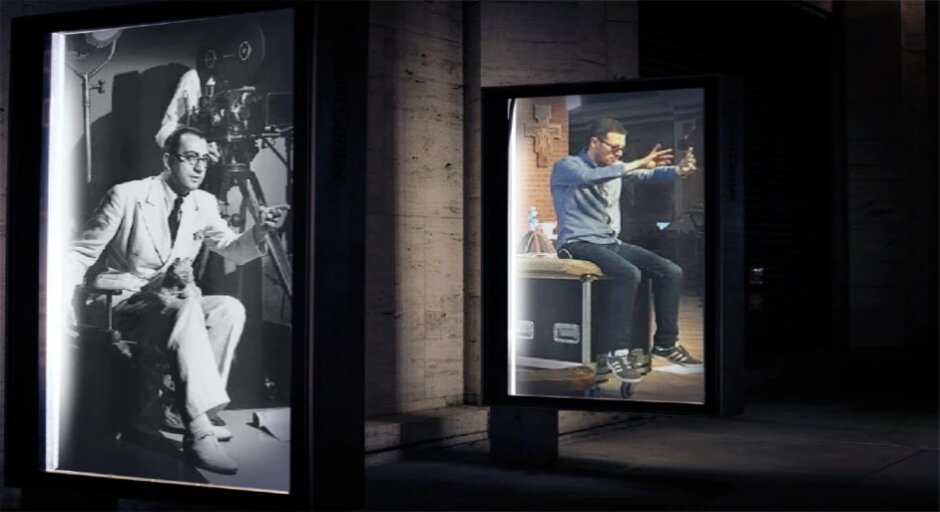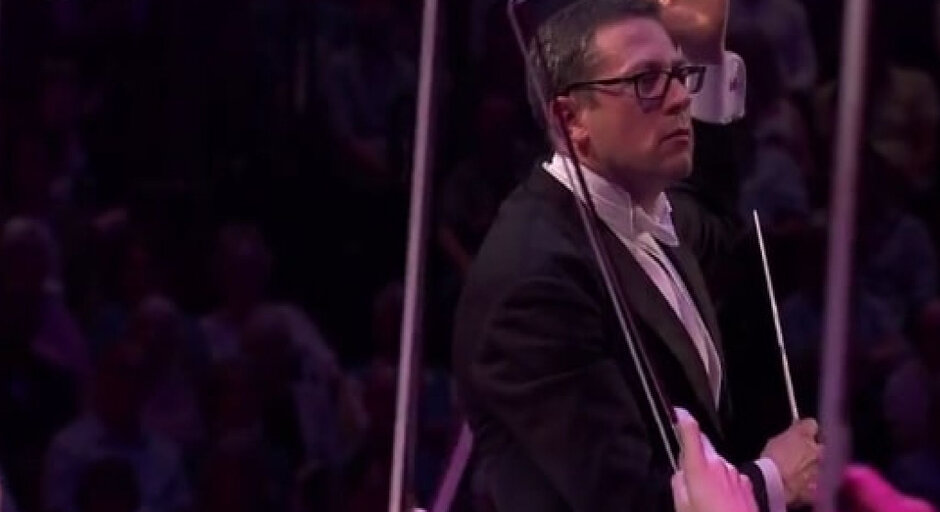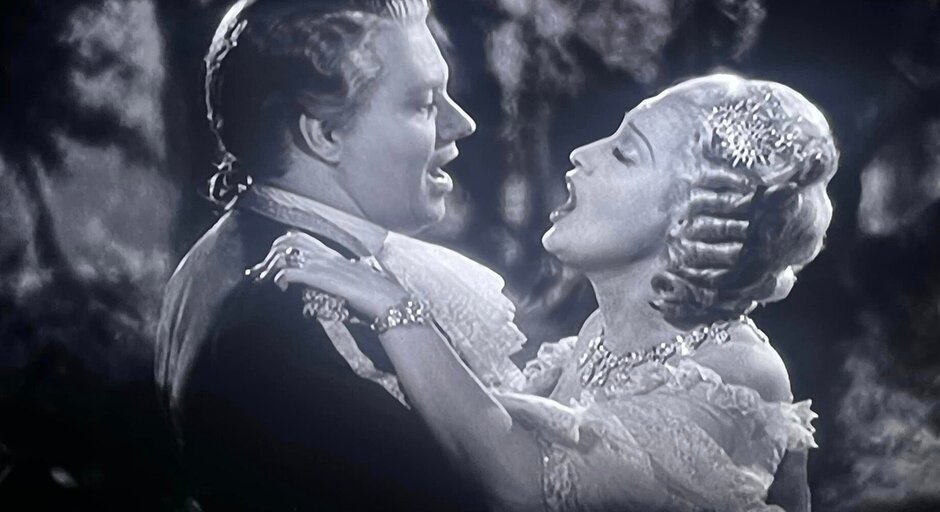From December, 2018. John Wilson, fire of my loins: You are a true musician, you command the finest magical mechanism Western Civilization has ever invented: the symphony orchestra, and you do this for a living. All life is asking you to do is to groove on it, and the fact that I’ll be continuing to make love to you long distance indefinitely.
Now, there are far more interesting exercises in the world of Schenkerian analysis (kidding, kidding!) than one huffy American ex-porn actress taking the piss out of a popular middle-ranking, BBC-scripted, English conductor… If it weren’t for the fact that ex-porn actress happens to have fallen in love with aforementioned Conductor and longs for him regularly. Therefore she takes Conductor’s pronouncements a little more seriously, a little more discerningly than she would, say, the pronouncements of her own musical compatriots—Alsop, Tilson Thomas, Mauceri etc… Additionally, Conductor reveals in his public statements more about himself than I think he’d prefer, John.
So as much as I’d enjoy ragging you for the impudent (and ultimately self-revealing) remarks you made about Mrs Bernstein and Mrs Coates, I really should finally get down to the one single thing (aside, of course, from your tearass tempi, your overuse of percussion, your rushing of singers, your astonishing lack of color in certain critical pieces) that has bugged me since the day I first encountered it: your juvenile dismissal of my old boss, film/stage director Rouben Mamoulian, and his creative contribution to the original 1943 production of Oklahoma! Now, I know you were only riffing off info you got from some book or Andre Previn, who likely socialized with The Old Man when they were both at MGM. But, as I mentioned in an old posting, of all his stage and screen work The Old Man liked to talk about, the one he liked to talk about the most was Oklahoma! And I turned out to be his perfect audience, because early on I’d confessed to him that I was a big Rodgers & Hammerstein fan. (Filipinos are big Rodgers & Hammerstein fans, for obvious reasons.)
But before I get to the point about Oklahoma! I have to tell you a side—though relevant—story about Mamoulian and Eugene O’Neill.
 Rouben Mamoulian and John Wilson at around the same age (40), 80 years apart.
Rouben Mamoulian and John Wilson at around the same age (40), 80 years apart.
MAMOULIAN’S AND MY EUGENE O’NEILL STORY
This is the second story Mamoulian ever told me back in 1978 when he was 81 and I was 23, which he told me in a way that was flattering as hell, which was he didn’t ask if I knew who Eugene O’Neill was, although I did say “Wow” at the mention of the name, so he might have sized up my interest that way, and just went right into the story.
Seems that when he was living an emigre’s life in New York, trying to make a go of it in stage work, he scored his greatest career triumph to date: The Theater Guild wanted him to direct a play by Eugene O’Neill. Now, O’Neill had already won the Pulitzer and he’d already had several successes, not to mention his other new play, Strange Interlude, was already generating a lot of pre-opening night buzz, so we’re talking King of 1928 Broadway here. O’Neill agrees to meet Mamoulian in his hotel room (that is to say, O’Neill’s hotel room. It seems like the best stories about O’Neill take place in hotel rooms) to talk over any directorial concerns O’Neill, the playwright, might have, and if he has any advice to give this youngster concerning his play.
“Actually, Mr O’Neill,” says Mamoulian, trying to sound like himself at thirty, you know, the brash but confident whiz-kid, “I know exactly how to fix your play.”
“You will change not a word. Not a word!” says O’Neill. And here The Old Man doesn’t bother to actually imitate O’Neill, although in time I heard him do some good impressions of other people, mostly actors.
“Look here, Mr O’Neill,” says young Mamoulian, opening the bound script of Marco Millions that he brought with him. “I can show you exactly where the speeches slow the play down, and where we can achieve the same ends using action. Here—” And here The Old Man imitates taking a blue pencil and gleefully slashing a diagonal line across a rejected page like editors do— “—and here—” He goes on to recreate his turning the pages of the script one at a time— “and here—here—here—” with a slash! slash! slash! And all the time I’m thinking with a kind of growing horror: You CUT Eugene O’Neill!!!?
“But in the end,” Mamoulian assures me, “he saw that I was right, and we got along splendidly.”
But that’s not the end of the story. About a year after Mamoulian and I go our separate ways, I get a chance to attend opening night of Marco Millions at Berkeley Stage Company up in the Bay Area, as the plus-one of some guy I was seeing. This was around the time BSC was on its “classics” kick, making it clear in news and ads and publicity sheets that this wasn’t just any old O’Neill revival, this was an extra-special homage to the master playwright of our great theatrical heritage. Scenes cut from the 1928 production had been restored in order that this fruit of O’Neill’s genius be presented intact and full; Mamoulian’s name was hardly mentioned.
Well, I watch this big lumbering thing, right through the parts that dragged on and on with their interminable speeches about the redistribution of wealth and so on, and I’m thinking, this must be where he cut, here— Then here— And here— And almost like he’s whispering in my ear “See? See?” I realize that The Old Man was right to make the cuts, and that Marco Millions probably could have been a fine piece of theater if they’d stuck to the original opening night version.
But I swear, it was not on my mind to argue this during lobby talk after the curtain. The big thing on my mind was that I had the perfect story to share at this particular time, in this particular space, and yeah, I wanted to share it. I was with the guy who brought me, a cokehead freelance lighting designer who was always hitting up people for jobs. Together we went up to the artistic directors, a married couple, my date immediately starting in with the whole buttering up thing, you know, You look fabulous what have you been doing to yourself, etc etc etc.
I break in with something like, “You know, I have a great story about this play I got straight from (and here I made sure to stress the second syllable like he preferred) Rouben Mamoulian and how he worked with—”
And here the guy, my date, takes me aside and mutters as urgently but tenderly as is possible for him, “Sweetheart, would you please shut up while I’m talking business.”
Reader, I did.
So everyone, this is the first time—the very first time—in thirty-eight years I’m telling this story.
- “The Story So Far, with Conductor John Wilson”
- “The Story So Far; Or, Conductor John Wilson—His Limits”
- “Cantara Christopher Gives Her Beloved Conductor John Wilson Crib Notes on Todd Field’s Screen Masterpiece, Tár: Love, Teshuvah, and Filipinos Will Save Western Music”
FULL DRESS // A gifted mesmerist—a sinister composer—a naive young conductor from the north…inspired by an episode from the life of Rachmaninoff // DOWNLOAD FREE BOOK POSTER


 Fah Lo See watches with lust-crazed eyes as her dad turns the handsome English adventurer into her
Fah Lo See watches with lust-crazed eyes as her dad turns the handsome English adventurer into her 



 What do you do when you’re a passionate actress still in love with a wounding bastard who’s a screen genius? You make the damn movie.
What do you do when you’re a passionate actress still in love with a wounding bastard who’s a screen genius? You make the damn movie.

 Above bloodily hardworking John: Kim Criswell, the Maida Vale Singers and The John Wilson Orchestra tear into the Gershwin brothers’
Above bloodily hardworking John: Kim Criswell, the Maida Vale Singers and The John Wilson Orchestra tear into the Gershwin brothers’ 
